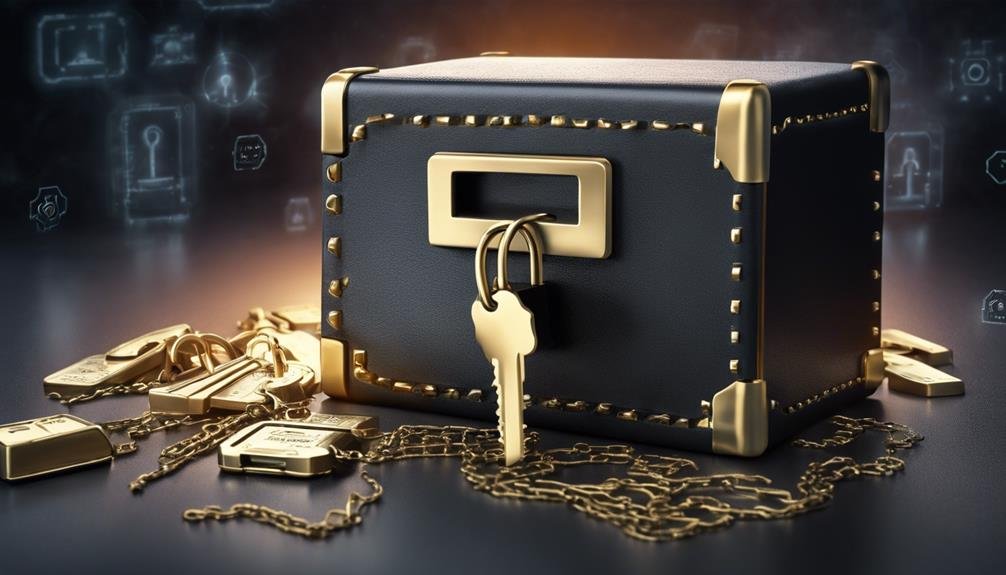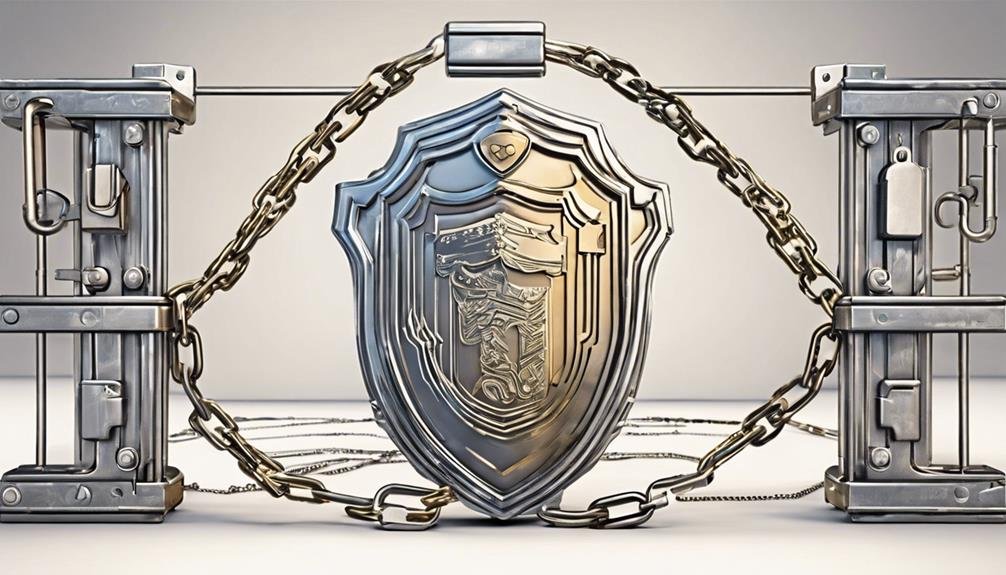Decentralized wallets guarantee safety by granting users sole control over private keys. Keeping these keys offline minimizes unauthorized access risks. Enhanced security measures in decentralized exchanges safeguard users’ assets. Full autonomy over digital assets allows for secure transactions and shields against external interference. Cold wallets add protection by storing keys offline in hardware, reducing online hacking threats. Hot wallets prioritize speed but require robust security measures. Eliminating centralized authority empowers users, reinforcing privacy and autonomy. To uncover more insights on decentralized wallet security, explore the benefits of enhanced user control, reduced third-party risks, and protection against cyber threats.
Brief Overview: Benefits Of Decentralized Crypto Wallet Security
- Exclusive control over private keys enhances security.
- Elimination of centralized authorities reduces interference.
- Offline storage in cold wallets minimizes online risks.
- Robust security measures protect funds in hot wallets.
- Decentralization prioritizes user privacy and autonomy.
Enhanced User Control and Security
How does decentralized wallet technology empower users to maintain enhanced control and security over their digital assets? Decentralized wallets play a pivotal role in ensuring the security of users’ crypto assets by providing them with exclusive control over their private keys. Unlike centralized wallets, where private keys are stored on third-party servers, decentralized wallets enable users to manage their funds directly, reducing the risk of unauthorized access. By keeping private keys offline and secure, decentralized wallets minimize the likelihood of data breaches and unauthorized transactions.
Moreover, using decentralized exchanges adds an extra layer of protection for users’ assets, enhancing security protocols and safeguarding against potential threats. Access to private keys is fundamental in decentralized setups, ensuring users have full control over their digital assets. This increased level of control empowers users to make transactions securely and confidently, knowing that their assets are protected from external interference.
Reduced Risk of Third-Party Interference

Decentralized wallets offer users a heightened level of security by reducing the risk of third-party interference through exclusive control over their private keys. This exclusive access and control empower individuals to secure their digital assets effectively. The advantages of decentralized wallets in this regard are:
- Eliminating Intermediaries: Decentralized wallets enable users to manage their funds without any central authority, reducing the risk of external manipulation or censorship of transactions.
- Enhanced Security: By keeping private keys offline and in the hands of the users themselves, decentralized wallets guarantee full autonomy over their digital assets. This practice notably reduces the risk of unauthorized access or control by third parties.
- Full Autonomy: With decentralized wallets, users have complete control over their transactions, enhancing the security of their assets by eliminating the potential for third-party interference. This level of control provides peace of mind and confidence in the security of one’s digital funds.
Protection Against Cyberattacks With Cold Wallets

Protection against cyberattacks is greatly enhanced through cold wallets, which securely store private keys offline in hardware devices. By keeping private keys in offline storage, cold wallets provide additional protection against online threats such as hacking and phishing attempts. This offline storage method remarkably reduces the risk of unauthorized access to digital assets stored in the wallet. Cold wallets, like Ledger and Trezor, are designed for long-term storage of cryptocurrencies, ensuring that private keys are inaccessible to cybercriminals.
Using hardware devices in cold wallets adds extra security, making it more challenging for cyber attackers to compromise the stored private keys. This enhanced security feature makes cold wallets a preferred choice for individuals looking to safeguard their digital assets from cyberattacks. Overall, cold wallets offer a secure and reliable solution for storing cryptocurrencies while minimizing the risks associated with online threats.
Privacy and Accessibility With Hot Wallets

When considering the security implications of different types of wallets, it becomes essential to understand the contrasting aspects of privacy and accessibility offered by hot wallets. Hot wallets, such as the popular Defi Wallet MetaMask, provide users with a seamless experience in managing their digital assets and engaging with decentralized finance (DeFi) platforms and dApps due to their connectivity to the internet. Here are key points regarding privacy and accessibility with hot wallets:
- Quick Transaction Speed: Hot wallets enable swift transactions by storing private keys on internet-connected devices, prioritizing accessibility for users seeking efficient cryptocurrency dealings.
- Convenient Asset Management: Users can easily interact with various decentralized applications and manage their digital assets using hot wallets, enhancing the overall user experience within the crypto space.
- Security Considerations: Despite their convenience, users must implement robust security measures to protect their funds in hot wallets, balancing accessibility with the necessary precautions to safeguard their investments.
Elimination of Centralized Authority

With the removal of centralized authority in the domain of decentralized wallets, users gain unprecedented control over their funds and data. Decentralized wallets operate without the need for a central entity to oversee or manage users’ assets. This shift empowers individuals with exclusive control over their private keys, greatly reducing the risk of external interference and unauthorized access. By eliminating a central point of failure, decentralized wallets offer enhanced security measures, providing robust protection against hacking attempts and data breaches.
Furthermore, the absence of a single controlling entity enhances user privacy and autonomy within decentralized wallet systems. Users can operate independently without relying on third-party service providers to manage their transactions or personal information. This autonomous structure bolsters user privacy and minimizes the potential for data vulnerabilities often associated with centralized systems. Essentially, eliminating centralized authority in decentralized wallets enhances user control and security and prioritizes individual autonomy and protection against external threats.
Frequently Asked Questions
What Are the Benefits of Decentralized Wallets?
Decentralized wallets offer users heightened privacy protection, user control, transparent transactions, resistance to hacking, immutable records, lower fees, global accessibility, and no central authority. They guarantee enhanced security through a decentralized network.
Are Decentralized Wallets Safe?
Decentralized wallets provide a secure environment for users to manage their digital assets. With private key control, data encryption, and trustless transactions on decentralized networks, users benefit from enhanced security features like multisig protection and immutable records.
Why Is the Decentralized Ledger More Secure?
Blockchain technology provides a secure decentralized ledger through peer-to-peer transactions. Private keys, immutable records, and data encryption enhance security. Distributed networks, transparent systems, and decentralized consensus create a trustless environment, reducing risks and ensuring the integrity of transactions.
What Makes a Crypto Wallet Secure?
A secure crypto wallet prioritizes safeguarding private keys through robust encryption, multi-factor authentication, and cold storage practices. User-controlled transactions, peer-to-peer networks, immutable ledgers, enhanced privacy, and open-source protocols amplify security measures for digital asset protection.
Conclusion
To sum up, decentralized wallets offer enhanced security and control, reducing the risk of third-party interference and protecting against cyberattacks. With cold wallets providing heightened protection and hot wallets ensuring privacy and accessibility, decentralized wallets eliminate centralized authority. Think of decentralized wallets as a fortress for your digital assets, guarding them against potential threats and allowing you to safeguard your wealth independently.










